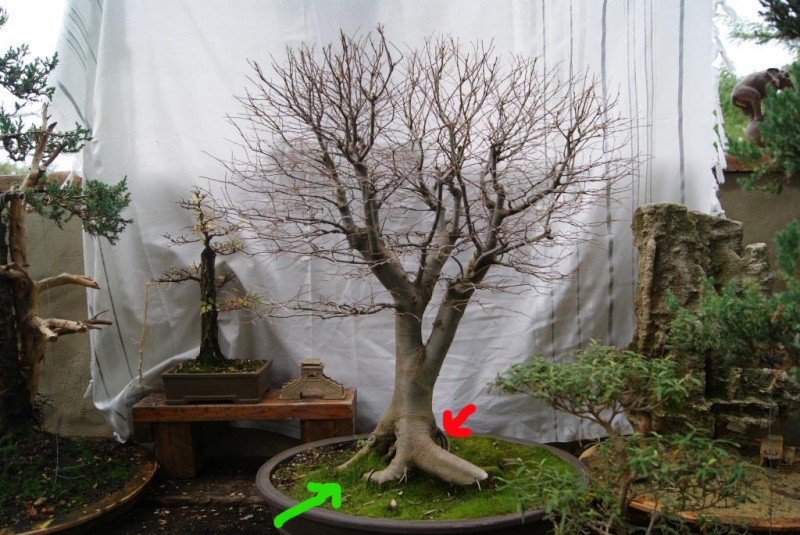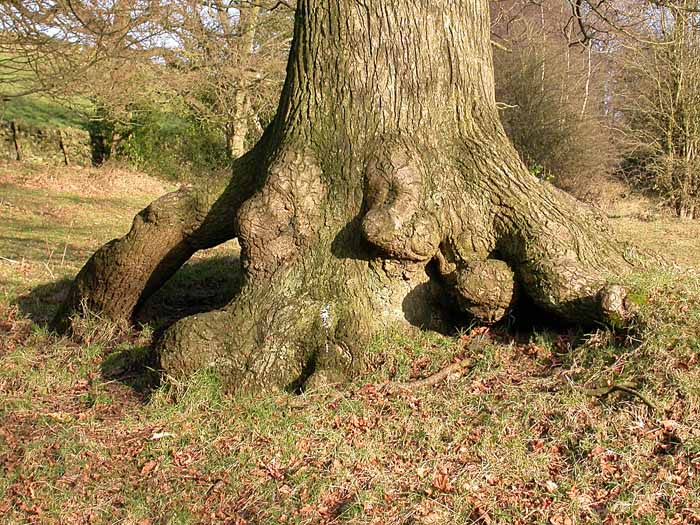My Broom Celtis
+23
vietnhat
Floris
Marco Giai-Coletti
Leo Schordje
GerhardGerber
David Willoughby
lennard
leatherback
Todd Ellis
snobird
AlainK
MikeG
Khaimraj Seepersad
my nellie
Walter Pall
Fore
Sakaki
Mr Miyagi
Oliver Muscio
reddog
Gary Swiech
jrodriguez
Andre Beaurain
27 posters
Page 1 of 3
Page 1 of 3 • 1, 2, 3 

Andre Beaurain- Member
 Re: My Broom Celtis
Re: My Broom Celtis
[quote="Andre Beaurain"]Very Nice Jrodriguez.
I forgot to thank Rob for this tread. well done.
Here is my broom: Celtis africana White Stinkwood
Catogory: Bonsai
Origin: Seedling 1995
Form: Tree
Style: Broom
Method: Clip and grow
Pot: ? o shit.

Andre,
Nice tree. If possible, you might air layer the tree, as displayed by the red line. Just a thought:

I forgot to thank Rob for this tread. well done.
Here is my broom: Celtis africana White Stinkwood
Catogory: Bonsai
Origin: Seedling 1995
Form: Tree
Style: Broom
Method: Clip and grow
Pot: ? o shit.

Andre,
Nice tree. If possible, you might air layer the tree, as displayed by the red line. Just a thought:


jrodriguez- Member
 Re: My Broom Celtis
Re: My Broom Celtis
Jrodrigues, thank you and I mean this in the nicest possible way.. but why should I airlayer it, you think the root is ugly?
Does anybody else think that I should do this?
Does anybody else think that I should do this?

Andre Beaurain- Member
 Re: My Broom Celtis
Re: My Broom Celtis
Yes. I think an air layer should be preformed right where the Yellow line. The tree's nebari has that root that way too large.
An air layer would give you a 25% angle going into the ground and flat. You can do that with an air layer.
It would look much better.
An air layer would give you a 25% angle going into the ground and flat. You can do that with an air layer.
It would look much better.

Gary Swiech- Member
 Re: My Broom Celtis
Re: My Broom Celtis
Ramification is nice on top. However, the big straight root in front needs to either be put in back or layer this tree. In my humble opinion the transition on the left main branch too abrupt and does not look natural. Perhaps this may work its way in the future. Nice work on top though!Andre Beaurain wrote: but why should I airlayer it, you think the root is ugly?
Does anybody else think that I should do this?
reddog- Member
 Re: My Broom Celtis
Re: My Broom Celtis
Dear Jrodreguez,
Thank you for the virtual, and your idea probably does improve my tree... but what is the reason for you to suggest it, do you think the root is distracting? Do you think the root is to big?
Thank you for the virtual, and your idea probably does improve my tree... but what is the reason for you to suggest it, do you think the root is distracting? Do you think the root is to big?

Andre Beaurain- Member
 Re: My Broom Celtis
Re: My Broom Celtis
O Gary I only saw your comment now. So the root IS to big. What if I sink it more into the ground.... will that help?

Andre Beaurain- Member
 Re: My Broom Celtis
Re: My Broom Celtis
To answer you question, it's just a matter of proportions. The roots are way too young looking for an old looking top. Celtis air layer well. With proper care, your tree can be world class. You have to give the tree the opportunity to be great. A new set of roots will improve this tree 100 fold. A bigger/wider flare in not always a synonymous with age and character. In this case, it makes the whole composition look young.
Kind regards,
Jose Luis
Kind regards,
Jose Luis

jrodriguez- Member
 Re: My Broom Celtis
Re: My Broom Celtis
I also find the large root slanting to the right to be distracting. It almost appears to be a continuation of the trunk, and it tends to lead my eye down rather than up.
Oliver
Oliver
Oliver Muscio- Member
 Re: My Broom Celtis
Re: My Broom Celtis
It also has the same thick root at the back, will take a photo tomorrow, dark outside now.
dont you guys think the trunk will look to short?
dont you guys think the trunk will look to short?

Andre Beaurain- Member
 Re: My Broom Celtis
Re: My Broom Celtis
The large root doesn’t bother me that much. Planted a little deeper would do the job for me. I am not a fan of air layers. I think it take character and uniqueness away from a tree. If it bothers you too much, you could always make a dead feature from it.

I think the two small roots at the back should be removed (red) and maybe a possible change of angle (green)??
But all in all I think it looks very nice indeed.


I think the two small roots at the back should be removed (red) and maybe a possible change of angle (green)??
But all in all I think it looks very nice indeed.


Mr Miyagi- Member
 Re: My Broom Celtis
Re: My Broom Celtis
Andre Beaurain wrote:No seriously. I was joking, but why should I airlayer it, you think the root is ugly?
Does anybody else think that I should do this?
Yes!

Or do you have alternate front?
Taner

Sakaki- Member
 Re: My Broom Celtis
Re: My Broom Celtis
[quote="Mr Miyagi"]The large root doesn’t bother me that much. Planted a little deeper would do the job for me. I am not a fan of air layers. I think it take character and uniqueness away from a tree. If it bothers you too much, you could always make a dead feature from it.

This is nice! ...If done convincingly It would give so much character to the tree.
...If done convincingly It would give so much character to the tree.
regards,
jun

This is nice!
 ...If done convincingly It would give so much character to the tree.
...If done convincingly It would give so much character to the tree.regards,
jun
Guest- Guest
 Re: My Broom Celtis
Re: My Broom Celtis
Yes yes yes
Thank you Mr Miyagi, that is awesome, and a much better idea!!! There was no way that I would have sacrificed this trees roots, and your idea is just a lovely compromize.
Thanks Jun I trust your taste completely!!
Thank you Mr Miyagi, that is awesome, and a much better idea!!! There was no way that I would have sacrificed this trees roots, and your idea is just a lovely compromize.
Thanks Jun I trust your taste completely!!

Andre Beaurain- Member
 Re: My Broom Celtis
Re: My Broom Celtis
Hi Andre
I like your tree very much...and like everybody else, do I think the tree can become much better if something is done to the roots. ( it also have a problem on the backside, you say)
What you decide is a matter of personal taste, and it is your tree .
.
It is said that this specie is easily layered, so this problem shold not stop you from deciding this option.
On this elegant tree, would I decide for the layering, as it will give a fine trained classic tree, that can be a showstopper in the future.
The other option would I only use, if the the specie would not easily root from layering....I also think, this option is better for a slightly more rough tree, with no other options.
Every time it is possible to keep a classic refined style, will I do what I can to keep it ....There are so many more trees out there ( yamadori) who need something else done to them...They are also worth looking at, no doubt about that.....but if you have this rare option, dont blow it.
Kind regards Yvonne IMHO
I like your tree very much...and like everybody else, do I think the tree can become much better if something is done to the roots. ( it also have a problem on the backside, you say)
What you decide is a matter of personal taste, and it is your tree
It is said that this specie is easily layered, so this problem shold not stop you from deciding this option.
On this elegant tree, would I decide for the layering, as it will give a fine trained classic tree, that can be a showstopper in the future.
The other option would I only use, if the the specie would not easily root from layering....I also think, this option is better for a slightly more rough tree, with no other options.
Every time it is possible to keep a classic refined style, will I do what I can to keep it ....There are so many more trees out there ( yamadori) who need something else done to them...They are also worth looking at, no doubt about that.....but if you have this rare option, dont blow it.
Kind regards Yvonne IMHO
Guest- Guest
 Re: My Broom Celtis
Re: My Broom Celtis
Yvonne I hate you.... now I've got to rethink this AGAIN. Your reasoning make sense.
Celtis africana does layer very easily. So that wont be a problem.
Do you also think that the trunk is long enough for that, I still think the tree will look to short,
maybe its because I'm use to the height it is?
Anyway, I will still take a photo of the back, it has the same thickness root aswell. Its pouring down with rain outside......its going to be a long tipical Cape Winter rain..........soft and continious.....so maybe tomorrow I will photograph it.
Love and light
Celtis africana does layer very easily. So that wont be a problem.
Do you also think that the trunk is long enough for that, I still think the tree will look to short,
maybe its because I'm use to the height it is?
Anyway, I will still take a photo of the back, it has the same thickness root aswell. Its pouring down with rain outside......its going to be a long tipical Cape Winter rain..........soft and continious.....so maybe tomorrow I will photograph it.
Love and light

Andre Beaurain- Member
 Re: My Broom Celtis
Re: My Broom Celtis
Hi Andre
Some kinds of hate, I just love
"They" say, the lowest branch should begin 1/3 up the trunk of the intire tree, so no problem.
Have a very nice rainy day.
Kind regards Yvonne
Some kinds of hate, I just love
"They" say, the lowest branch should begin 1/3 up the trunk of the intire tree, so no problem.
Have a very nice rainy day.
Kind regards Yvonne
Guest- Guest
 Re: My Broom Celtis
Re: My Broom Celtis
Mr Miyagi wrote:The large root doesn’t bother me that much. Planted a little deeper would do the job for me. I am not a fan of air layers. I think it take character and uniqueness away from a tree. If it bothers you too much, you could always make a dead feature from it.
I think the two small roots at the back should be removed (red) and maybe a possible change of angle (green)??
But all in all I think it looks very nice indeed.
Dead features on Celtis.....not the best option. Wood rots easily, creating further health issues down the line. The top features a serene quality that could only benefit with a new set of roots. This option will really bring out the best in the tree.
Just the fact that people have suggested carving the bottom supports the idea that there is a problem in the base of the tree that needs to be addressed. Again, we only give suggestions. In the end, it is your tree and you should make the decisions.
Regards,
Jose Luis

jrodriguez- Member
 Re: My Broom Celtis
Re: My Broom Celtis
Thank you Mr Miyagi, that is awesome, and a much better idea!!! There was no way that I would have sacrificed this trees roots, and your idea is just a lovely compromise.
Thanks Jun I trust your taste completely!!
It needs an air-layer.

Gary Swiech- Member
 Re: My Broom Celtis
Re: My Broom Celtis
Gary Swiech wrote:Thank you Mr Miyagi, that is awesome, and a much better idea!!! There was no way that I would have sacrificed this trees roots, and your idea is just a lovely compromise.
Thanks Jun I trust your taste completely!!
It needs an air-layer.
I agree. Very nice otherwise

Fore- Member
 Re: My Broom Celtis
Re: My Broom Celtis
In my humble opinion with an air layer you would be taking the tree down the path of unique conformity and destroy the naturalistic essence. Going down that route and picking branches with the first at 1/3 of the way up and so on is just not to my taste as I find it too generic. Dead wood can easily be preserved with the right care and attention. Rather than discard it, make it into a point of interest. Trees in nature also often have this problem but still maintain their beauty. Maybe my virtual was a bit harsh but something slightly more subtle might be appropriate. What would a master like Walter Pall do?

Mr Miyagi- Member
 Re: My Broom Celtis
Re: My Broom Celtis
Mr Miyagi wrote:In my humble opinion with an air layer you would be taking the tree down the path of unique conformity and destroy the naturalistic essence. Going down that route and picking branches with the first at 1/3 of the way up and so on is just not to my taste as I find it too generic. Dead wood can easily be preserved with the right care and attention. Rather than discard it, make it into a point of interest. Trees in nature also often have this problem but still maintain their beauty. Maybe my virtual was a bit harsh but something slightly more subtle might be appropriate. What would a master like Walter Pall do?
Naturalistic essence? Does this mean doing nothing? It is just a matter of proportions. As is, the roots are NOT in proportion with the upper portion. An air layer offers a simple solution to a minor problem that reflects a mayor defect on the total design. Even in your so called naturalistic approach, you agree that the lower portion needs attention. Adding dead wood and hollows only makes the defect a lot more visible; it does not correct it.
So I ask, does wiring the tree also eliminate the naturalistic essence? I think not. Wiring, directional pruning, layering, grow and cut, and choosing the right container are all techniques that enable us to achieve a design. In this case, the top of the tree offers the image of an old giant. Unfortunately, the elongated roots give the tree the appearance of being young. They eliminate the serene/quiet feeling image of the top.
As far as what will Walter Pall do, only he can answer the question. Perhaps he might choose to offer his opinion. The more the better!!!
Warm regards,
Jose Luis

jrodriguez- Member
 Re: My Broom Celtis
Re: My Broom Celtis
jrodriguez wrote:Mr Miyagi wrote:In my humble opinion with an air layer you would be taking the tree down the path of unique conformity and destroy the naturalistic essence. Going down that route and picking branches with the first at 1/3 of the way up and so on is just not to my taste as I find it too generic. Dead wood can easily be preserved with the right care and attention. Rather than discard it, make it into a point of interest. Trees in nature also often have this problem but still maintain their beauty. Maybe my virtual was a bit harsh but something slightly more subtle might be appropriate. What would a master like Walter Pall do?
Naturalistic essence? Does this mean doing nothing? It is just a matter of proportions. As is, the roots are NOT in proportion with the upper portion. An air layer offers a simple solution to a minor problem that reflects a mayor defect on the total design. Even in your so called naturalistic approach, you agree that the lower portion needs attention. Adding dead wood and hollows only makes the defect a lot more visible; it does not correct it.
So I ask, does wiring the tree also eliminate the naturalistic essence? I think not. Wiring, directional pruning, layering, grow and cut, and choosing the right container are all techniques that enable us to achieve a design. In this case, the top of the tree offers the image of an old giant. Unfortunately, the elongated roots give the tree the appearance of being young. They eliminate the serene/quiet feeling image of the top.
As far as what will Walter Pall do, only he can answer the question. Perhaps he might choose to offer his opinion. The more the better!!!
Warm regards,
Jose Luis
I see your point and I agree the root needs attention but make’s the tree look no more juvenile than this root makes this old oak look juvenile.

I disagree that a dead area would make the defect more visible. On the contrary I believe it would eliminate the defect and create a good point of interest. I don’t believe wiring stops the natural essence any more than reducing leaf size as it creates the movement that large old trees gain through size. If we all used air layers to correct deficiencies in difficult material, surely all our trees would look the same at ground level. I’m not saying this is right, just personal preference. I just prefer to work with what Mother Nature has given the tree. Would love to see it from some more angles though.

Mr Miyagi- Member
 Re: My Broom Celtis
Re: My Broom Celtis
Mr Miyagi wrote:jrodriguez wrote:Mr Miyagi wrote:In my humble opinion with an air layer you would be taking the tree down the path of unique conformity and destroy the naturalistic essence. Going down that route and picking branches with the first at 1/3 of the way up and so on is just not to my taste as I find it too generic. Dead wood can easily be preserved with the right care and attention. Rather than discard it, make it into a point of interest. Trees in nature also often have this problem but still maintain their beauty. Maybe my virtual was a bit harsh but something slightly more subtle might be appropriate. What would a master like Walter Pall do?
Naturalistic essence? Does this mean doing nothing? It is just a matter of proportions. As is, the roots are NOT in proportion with the upper portion. An air layer offers a simple solution to a minor problem that reflects a mayor defect on the total design. Even in your so called naturalistic approach, you agree that the lower portion needs attention. Adding dead wood and hollows only makes the defect a lot more visible; it does not correct it.
So I ask, does wiring the tree also eliminate the naturalistic essence? I think not. Wiring, directional pruning, layering, grow and cut, and choosing the right container are all techniques that enable us to achieve a design. In this case, the top of the tree offers the image of an old giant. Unfortunately, the elongated roots give the tree the appearance of being young. They eliminate the serene/quiet feeling image of the top.
As far as what will Walter Pall do, only he can answer the question. Perhaps he might choose to offer his opinion. The more the better!!!
Warm regards,
Jose Luis
I see your point and I agree the root needs attention but make’s the tree look no more juvenile than this root makes this old oak look juvenile.[/url
No, if that oak were a bonsai, I would eliminate the left hanging root to create more stability. Also, the oak roots are totally different from the ones displayed by the celtis, which take all the visual weight of the tree and one is almost as thick as the trunk. It is like comparing apples and oranges. Just because nature created something, it does not mean that it is visually appealing.
[url=https://servimg.com/view/13936737/436]


jrodriguez- Member
Page 1 of 3 • 1, 2, 3 
 Similar topics
Similar topics» Celtis No 1
» Thinking on this Celtis.
» Collected Celtis from Oklahoma
» A celtis forest
» Celtis sinensis
» Thinking on this Celtis.
» Collected Celtis from Oklahoma
» A celtis forest
» Celtis sinensis
Page 1 of 3
Permissions in this forum:
You cannot reply to topics in this forum







